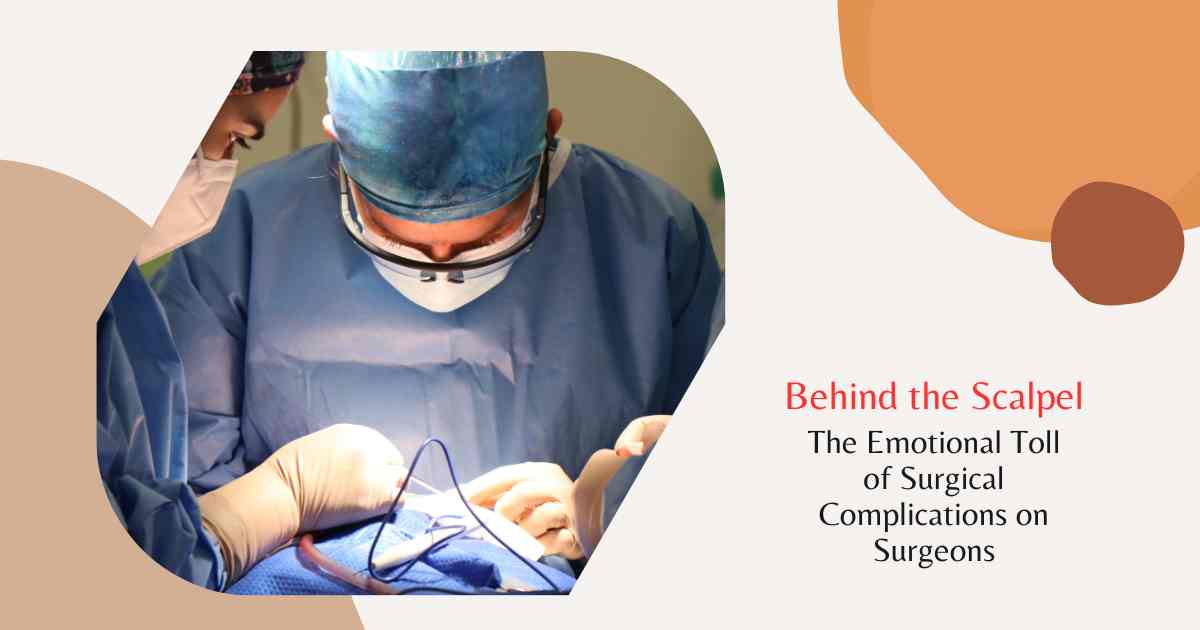
Surgery-related problems have a significant psychological impact on the surgeon in addition to having a physical impact on the patient. It is important to stress that surgical complications are different from surgical negligence. Largely surgical complications occur even when a surgical procedure goes smoothly and sometimes it is inevitable. But one must not undervalue the emotional toll they have on the surgeon.
For a surgeon, dealing with a surgical complication can be emotionally taxing. Despite our best efforts and intentions, difficulties might happen for a number of reasons, including the patient’s particular physiology, unanticipated anatomical differences, or unforeseen therapeutic reactions. In order to achieve the finest results, we surgeons put not only our time and talents into each treatment, but also our heart and soul. When difficulties develop, we may have a sense of personal failure that unfortunately makes us doubt our own talents.
What We Surgeons’ are Taught?
We surgeons are taught to put patients’ safety and well-being first. We spend our entire lives trying to help others, yet difficulties can be heartbreaking and leave us feeling helpless and demoralised at times. Even if the complication was beyond our control, seeing a patient suffer from an unanticipated complication can make us suffer from unnecessary guilt. Sometimes it can feel too much for us to bear to be responsible for the lives of our patients.
Surgical Complications and the Emotional Toll
Surgical complications can have an emotional effect that goes beyond what is being done right now. Surgeons who witness patients struggle with post-operative problems may feel a sense of loss and despair. We oftentimes wonder if there was anything else we could have done differently or if the surgery itself sometimes was a good idea. Sleepless nights, intrusive thoughts, and reliving the incident over and over while looking for explanations and trying to find closure are just a few signs of emotional upheaval.
The surgeon’s confidence may also be damaged by surgical problems. Sometimes we begin to question our abilities, knowledge, and discernment out of a concern that we aren’t meeting our own high standards. Self-imposed pressure and anxiety might result from the worry of continuing to make mistakes or from having to deal with legal implications. Our general wellbeing can be negatively impacted by these emotional loads, both personally and professionally. Here is another interesting study that is both interesting and disheartening. According to this study, surgeons who retire early at the age of 55 have a life expectancy of 80. However, if they choose to retire at 60, their life expectancy significantly drops to 63.
The discovery of a serious complication in a patient after their surgery can be the tipping point for some surgeons. They could experience discouragement and wonder if they can still succeed in their chosen field. Burnout can result from the emotional exhaustion and disappointment, which can make some surgeons want to give up their careers altogether. It is a loss that affects not just the surgeon but also the medical field as a whole and patients who may require their surgical expertise in the future.
It is critical to understand that complications are a necessary component of all surgical procedures. They don’t necessarily signify that a surgeon or his team is careless or incompetent. It needs to be reiterated that all surgeons are psychologically trained to heal and help people. Within the medical community, it is crucial to create a welcoming atmosphere where surgeons can freely share their experiences, ask for advice, and find comfort in the understanding of their peers.
How We Surgeons Cope?
Support groups, both inside and outside the surgical community, are essential for helping surgeons deal with the psychological fallout they may experience from such surgical complications. Surgeons can benefit from peer support groups, mentoring, counselling, and self-care techniques to help them process their feelings, develop resilience, and rekindle their enthusiasm for their line of work. It needs to be reiterated that all surgeons are psychologically trained to heal and help people.


